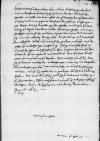List #2352
Anton FUGGER do Ioannes DANTISCUSAugsburg, 1540-11-09
| odebrano Allenstein (Olsztyn), 1541-01-23 Rękopiśmienne podstawy źródłowe:
| ||||
Tekst + aparat krytyczny + komentarz Zwykły tekst Tekst + komentarz Tekst + aparat krytyczny
Dem hochwirdigen fursten und herren / hern
Hochwirdiger Furst, Gnediger Herr. /
Euren Furstlichen Gnaden seind mein underthenig willig dienst zuvoran beraitt. /
Eurer F(urstlich) G(naden) cf.
Das wolt ich eurn F(urstlich) G(naden), / dero ich zu dienen willig bin, / undertheniger meinung nit verhalt(e)n. / Mit undertheniger bitt, / wo meine sachn an eur F(urstlich) G(naden) gelangen wurden, / eur F(urstlich) G(naden) wolle die in gnedigem bevelh und furdrung haben. / Das umb eur F(urstlich) G(naden) will ich dazuverdienen willig erfunden werden. / Thue mich hiemit euren F(urstlich) G(naden) underthenigklichn bevelhen. /
Datum
E(uer) F(urstlich) G(naden) unterdeniger


 BCz, 1599, p. 70
BCz, 1599, p. 70